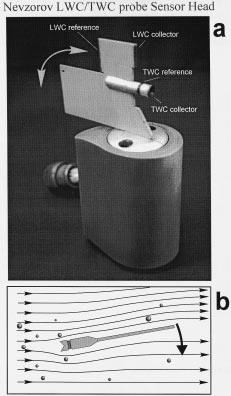The Nevzorov liquid water content (LWC) and total water content (TWC) probe is a constant-temperature, hot-wire probe designed for aircraft measurements of the ice and liquid water content of clouds. The probe consists of two separate sensors for measurements of cloud liquid and total (ice plus liquid) water content. Each sensor consists of a collector and a reference winding. The reference sensors are shielded from impact with cloud particles, specifically to provide an automatic compensation for convective heat losses.
The sensitivity of the probe is estimated to be approximately 0.003– 0.005 g m23. The accuracy of LWC measurements in nonprecipitating liquid clouds is estimated as 10%–15%. Tests at the NRC high-speed icing tunnel have provided verification of the TWC measurement for small frozen droplets to an accuracy of approximately 10%–20%, but verification in snow and natural ice crystals has not yet been possible due to the absence of any accurate standards. The TWC measurement offers not only the possibility of direct measurements of ice content but also improved liquid water contents in drizzle situations. Airborne measurements have provided data on the baseline drift and sensitivity of the probe and have provided comparisons to other conventional instruments. Several cases have been documented that exhibit the unique capabilities of the instrument to separate the ice and liquid components of supercooled clouds.


